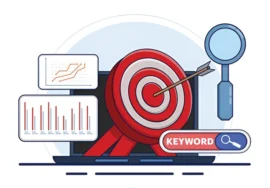
Consider Including Relevant Keywords in Your Titles to Improve Search Engine Optimization (SEO)
Understanding prizing Keywords in Titles
In the realm of digital marketing, search engine optimization (SEO) is paramount for businesses aiming to enhance their online visibility. A critical part of SEO is keyword optimization, and the title of your content plays a pivotal role in this process. By incorporating relevant keywords into your titles, you increase your chances of ranking higher in search engine results pages (SERPs).
What are the keywords?
Keywords are specific words or phrases that users use when searching for information online. Understanding and using these keywords is essential for attracting organic traffic to your website. By identifying the keywords relevant to your content and placing them within your titles, you can improve your website’s search engine visibility.
The Role of Titles in SEO
Titles serve as the headlines of your content, providing users with a concise summary of what to expect. Search engines also rely on titles to understand the topic of your page. By incorporating relevant keywords into your titles, you send clear signals to search engines about the content’s focus, making it more likely to be displayed in relevant search results.
Keyword Research: Finding Effective Title Optimization
Before crafting compelling titles, thorough keyword research is essential. This process involves identifying the keywords and phrases that your target audience is likely to use when searching for information related to your content. Several tools and techniques can aid you in conducting effective keyword research:
- Keyword Research Tools: use online platforms like Google Keyword Planner, SEMrush, Ahrefs, or Moz to discover popular keywords and their search volume.
- Competitor Analysis: Examine the titles of your competitors’ high-ranking content to find effective keyword usage.
- User Intent: Consider the search intent behind specific keywords. Are users looking for information, products, or services? Tailor your titles.
Crafting Compelling and Keyword-Optimized Titles
Once you have a list of relevant keywords, it’s time to create engaging and informative titles. Here are the key tips to follow:
- Include Primary Keyword: Incorporate your primary keyword within the title at the beginning for the greatest impact.
- Consider Secondary Keywords: If applicable, include one or two secondary keywords to enhance your title’s relevance.
- Keep it Concise: Aim for a title length of around 50–60 characters to make sure it displays in search results.
- Use Strong Action Verbs: Start your title with a compelling action verb to grab users’ attention.
- Add Value: Communicate the benefits or value proposition of your content in the title.
- Match Search Intent: make sure your title aligns with the search intent of your target audience.
- Avoid Keyword Stuffing: While it’s essential to include keywords, avoid overusing them as it can harm your SEO and readability.
Examples of Effective Keyword-Optimized Titles
To illustrate the concept, let’s consider a hypothetical blog post about content marketing. Here are examples of effective titles incorporating relevant keywords:
- Poor Title: Content Marketing Tips
- Improved Title: Boost Your Content Marketing Strategy with Proven Tips
- Keyword-Optimized Title: How to Create Engaging Content Marketing for Increased ROI
As you can see, the keyword-optimized title provides more specific information about the content and is more likely to attract relevant search traffic.
Measuring the Impact of Keyword-Optimized Titles
To gauge the effectiveness of your keyword-optimized titles, it’s essential to track relevant metrics. Consider the following:
- Organic Traffic: Monitor the amount of organic traffic your content receives over time.
- Keyword Rankings: Track the positions of your target keywords in search engine results.
- Click-Through Rate (CTR): Analyze the percentage of users who click on your title after seeing it in search results.
- Bounce Rate: Measure the percentage of visitors who leave your website after viewing a single page.
By regularly analyzing these metrics, you can identify which titles are performing well and make the necessary adjustments to improve your overall SEO strategy.
Additional Tips for Title Optimization
- Utilize Title Tags: The title tag is the HTML element that defines the title of a web page. Ensure it accurately reflects your content and includes relevant keywords.
- Create Unique Titles: Avoid duplicate titles across your website, as this can confuse search engines.
- Test Different Title Variations: Experiment with different title formats and keyword placements to find what works best for your audience.
- Stay Updated: Keep up with the latest SEO trends and algorithm updates to optimize your titles accordingly.
The Power of Keyword Placement: Beyond the Title
While optimizing your title with relevant keywords is a crucial step, it’s essential to extend keyword integration throughout your content. Strategic keyword placement can significantly enhance your SEO efforts and improve your overall search engine rankings.
Keyword Placement Best Practices
- Headings and Subheadings: Incorporate your target keywords into H1, H2, and H3 tags to provide clear structure and relevance to search engines.
- Introduction and Conclusion: Include keywords naturally within the opening and closing paragraphs to reinforce the content’s focus.
- Body Content: Distribute keywords strategically throughout the article, ensuring they flow naturally and add value to the reader. Aim for a keyword density of around 2-3%.
- Image Alt Text: Optimize image alt text with relevant keywords to improve accessibility and SEO.
- Internal Linking: Link to other relevant pages on your website using anchor text that includes your target keywords.
Keyword Variations and Synonyms
To avoid keyword stuffing and enhance your content’s readability, utilize synonyms and related terms. This approach helps search engines understand the broader context of your content while providing a better user experience.
Long-Tail Keywords: Targeting Specific Search Queries
Long-tail keywords are more specific phrases that users often employ when conducting detailed searches. By incorporating long-tail keywords into your content, you can attract highly targeted traffic and increase conversions.
Example:
- Short-tail keyword: “content marketing”
- Long-tail keyword: “How to create an effective content marketing strategy”
The Importance of User Experience
Remember, while keyword optimization is crucial, it should never overshadow the importance of creating valuable and engaging content. Prioritize user experience by providing informative, well-structured, and easy-to-read content.
Measuring and Refining Your Keyword Strategy
Continuously monitor your keyword performance using analytics tools to track rankings, traffic, and conversions. Adjust your keyword strategy accordingly to optimize your content for evolving search trends.
Conclusion
By incorporating relevant keywords into your titles and following the best practices outlined in this article, you can significantly enhance your website’s search engine visibility. Remember that keyword optimization is just one aspect of a comprehensive SEO strategy. Combining effective title optimization with high-quality content, strong internal linking, and other SEO tactics will help you achieve long-term success.





